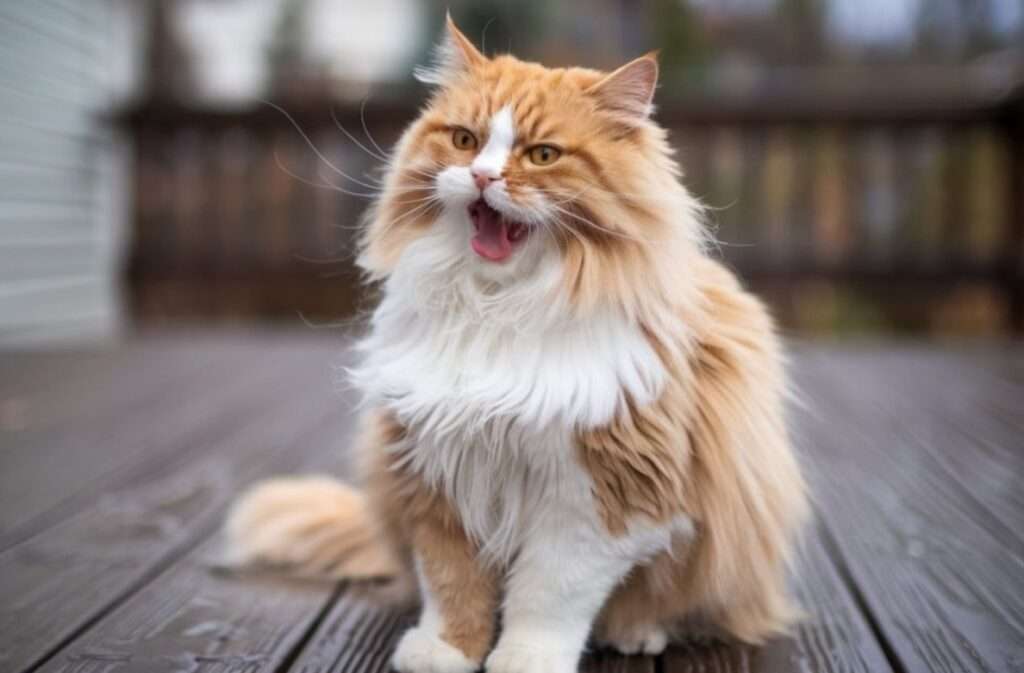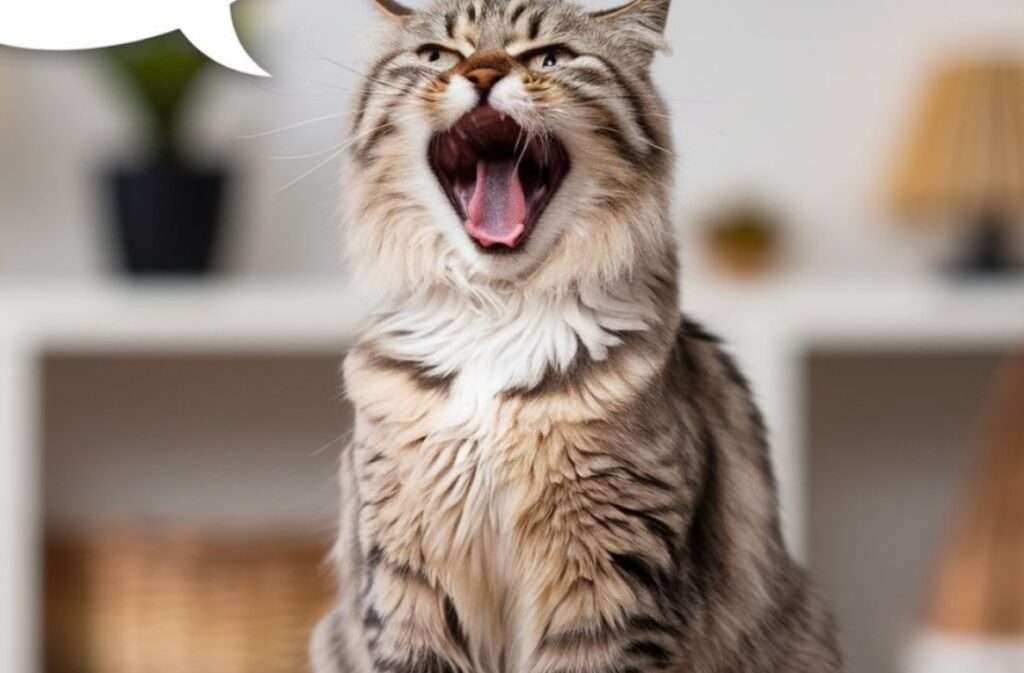Why Is My Cat Meowing So Much?

Cats meow when talking to us humans; it is their language of needs. Once in a while, they meow for food, attention, etc., but it’s always specifically meant for us pet owners.
Does your cat have an increased frequency in terms of communication? Nonstop meowing can drive anyone insane! But do not be afraid because this is not meant to disturb you; in most cases, there are legitimate reasons behind all that noise which we shall help unravel.
Different reasons lead to meowing; cats sometimes want food or attention while others might do so due to pain or stress experienced by them. Increasing frequency of the cat’s meowing may also indicate age development, mating urge, or change of environment. By knowing the reasons you will be able to solve the problem amicably.
Table of Contents
Attention-Seeking Behavior
Why does your cat meow so much? Well, your furry baby might be having some important needs to attend to. Some of the reasons may include hunger, seeking an audience, or health issues. Allow me to highlight these reasons in the following paragraphs.
1)Hunger or Thirst
Meow when there is hunger or thirst associated with cats. They will also start making sounds around their feeding bowls before they eat. Some other cats have been known to use insistence on meowing as a means of begging for treats.
One way to manage meowing related to food is to set up a fixed feeding timetable. This can be done using automatic feeders which offer meals at specific times even when you are not home. Such solutions help to reduce your cat’s anxiety concerning food and consequently lessen its excessive meowing rate.
2)Medical Issues
Every so often, too much meowing entails that the cat is sick or not feeling fine. Your feline may be in pain, uncomfortable, or sick. Any change in patterns or volume of yowling among cats can give a hint.
Nevertheless, if you think that this kind of meowing has something to do with the health of your pet consult a veterinarian. They will be able to check for underlying problems and give appropriate treatment. Routine health checks and monitoring as well can help detect any problems early enough before they become serious.
3)Mating Behavior
Unaltered animals can become quite vocal during mating season. For instance, female cats may yowl noisily when they want to attract mates whereas male ones might meow more often and try to escape outdoors looking for partners.
The most efficient way to deal with mating-related meowing is by spaying/neutering your cat since that eliminates hormone-triggered urges hence reducing such behavior. Alternatively, if fixing is not an option, managing the behavior through distraction techniques or maintaining serenity inside their habitats would help keep them calm.
4)Fear or Anxiety
A cat that is stressed or inflected might be expected to moan. This is due to changes that may occur in the environment, such as new people or even loud noises. Besides this, fearful felines tend to hide while they produce more sounds than ever before.
The best approach is to create an area where your cat feels calm and secure. Ensure that you keep their routine consistent and allow them a peaceful place for relaxation to reduce stress. You can also use pheromone sprays and other soothing mechanisms on them.
5)Age-Related Alterations
As cats grow older, they may start meowing frequently due to confusion or discomfort. Among common disorders affecting older cats include arthritis and cognitive decline which lead these animals to become quite vocal compared to when they were young. Such changes usually make them want special attention.
You should ensure that your aged feline’s environment is comfortable and easily navigable. If any health complications arise, regular visits to the veterinarian can help detect them early enough. It may also aid in reducing excessive meowing by keeping its surroundings calm.
Environmental Influences
A change in home environment that results in anxiety and increased meowings among cats, for instance, shifting to a new apartment or buying new furniture might cause the cats to meow excessively. They may also need time to acclimatize themselves which leads them into more meowings as they attempt coping strategies.
For that reason, consider introducing such changes slowly and retain the cat’s usual routine. If overwhelmed, this animal should have a private room. Over some days, it will adjust itself to the new atmosphere.
Night-Time Activities
Some of the reasons why these animals tend to be vocal during late hours include boredom or extra energy. Additionally, if you are asleep and the cat becomes hungry or there is an urge for your attention, such a situation can arise. Such behavior is always annoying, especially for those who own cats.
Apart from letting your cat out before bedtime so that it can exercise, it is important to have scheduled meals and playtimes at night to lessen their cries at night. This way they will not call out loudly when you need your sleep most.
Things to Try If Your Feline Is Constantly Meowing

In case you notice that your cat’s persistent meowing goes beyond any of the possible reasons available, then start by checking whether their basic needs are being met or not. Ensure that he has food, clean water, and a litter box that has already been used. In addition, check if there have been any changes made in their daily schedule which could make them unhappy.
If the meowing continues to persist even after fulfilling their needs, it may be necessary to see a veterinarian. Repeated howling can signify an illness. A professional will rule out any health problems and offer advice on behavior management.
Long-Term Solutions
To prevent excessive meowing over a long period, it is important to make regular visits to the vet. These appointments can help detect possible medical problems at an early stage, thereby ensuring your cat remains healthy without continued noise-making. Knowing that everything is fine with your pet gives another sense of security.
You should also consider getting some toys for your cat otherwise keeping it stimulated mentally may prove hard. Additionally stressing feeding schedules at set times within the day and having specific periods designated for play will greatly assist in decreasing stress levels hence controlling decreased strays from babbling.
Comprehending Feline Communication
- The cries of cats vary depending on their needs like food, attention or discomfort.
- A soft meow can mean your cat wants affection while as loud one might indicate stress.
- Body language like tail position and ear movement complements meowing in evoking different feelings.
- A happy cat may purr and rub against you while a scared one may hiss or hide.
- The thing is when talking to your cat, it’s crucial to pay attention to both sounds and movements at the same time.
Commonly Asked Questions
Constant meowing could mean why is my cat howling like a police siren.
Your cat could be meowing because it is hungry, seeking attention, or there are health problems; check if there is any area that needs checking within its nature.
How do I stop my cat from making noises at night?
Play with your cat before going to bed and follow a consistent nightly routine; it could assist him/her in settling down.
What should I do if suddenly my feline starts making strange noises?
A sudden change in how much or how often does one meow could indicate diseases; hence asking a veterinarian should be the priority.
How do I assist my elderly pet who always meows continuously?
Ensure that your room for your pet is comfortable enough to navigate around much easier since their level of obstacles increases because of old age; having a vet check-up frequently will also help ease any age-related issues.
How do I realize that something is wrong with my kitty?
Meowing excessively, hiding away from everything as well as showing anxious body language are common indicators that someone is undergoing stress indeed; thus giving such kinds of animals private areas and decreasing their anxiety may be useful.
Final words
The interesting thing is that the reasons behind your cat’s constant meowing can actually offer insight into the case at hand. There could be a possibility that they are trying to tell you they are starving, troubled, or unwell. By examining their conduct and means of life, hints about what caused them may be derived.
If you know the cause of their meowing, then you can do something about it to make them more at peace with themselves. Whether changing schedules, giving extra love or even seeking help from a veterinary office should suffice in meeting their needs; consequently resulting in tranquil and contented felines at home.


